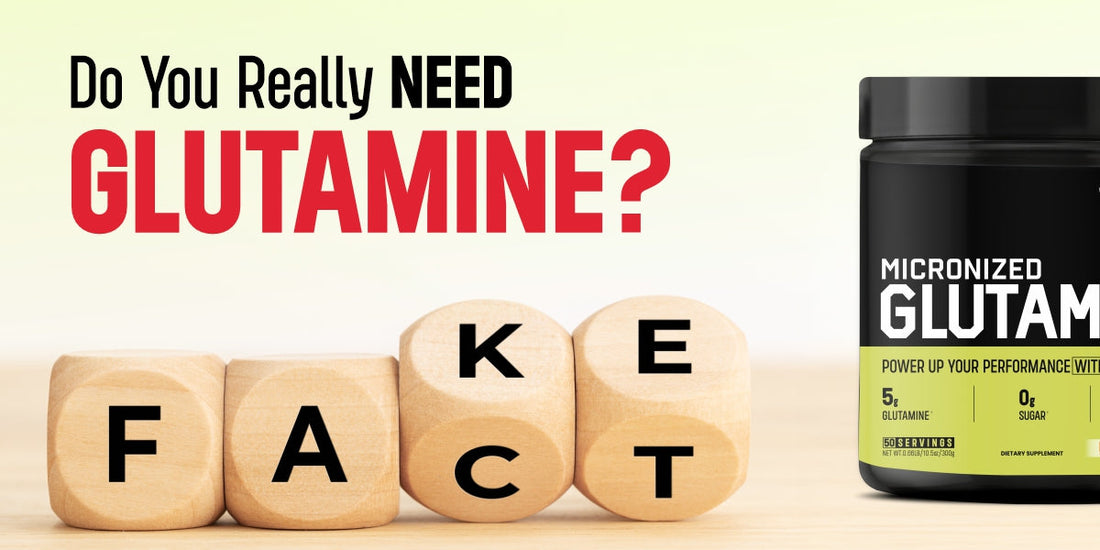
Do You Really Need Glutamine? Let’s Break Down the Science
byGlutamine has been marketed for everything from muscle recovery to gut health support—but do you really need to supplement it? Whether you're a fitness enthusiast, athlete, or simply trying to optimize health, it's important to know the truth about glutamine: what it is, how it works, and who actually benefits from taking it.
Let’s explore whether glutamine is an essential part of your supplement stack—or just another hype.
What Is Glutamine?
Glutamine is the most abundant amino acid in the human body. It exists in two forms:
- L-glutamine: The form found in foods and supplements
- D-glutamine: Less relevant for human biology
It's a conditionally essential amino acid, which means your body usually makes enough of it, except during times of extreme physical stress, illness, or trauma.
What Does Glutamine Do in the Body?
Glutamine plays several vital roles, including:
- Supporting muscle protein synthesis
- Fueling intestinal cells and promoting gut lining integrity
- Boosting immune system function
- Assisting in nitrogen transport and pH balance
- Supporting wound healing and recovery
Glutamine in Food Sources
You typically get enough glutamine from a balanced diet. Here are some rich dietary sources:
|
Food Source |
Glutamine (approx. per 100g) |
|
Beef |
1.2 g |
|
Chicken |
1.0 g |
|
Eggs |
0.6 g |
|
Tofu |
0.6 g |
|
Milk |
0.3 g |
|
Whey protein |
4–10% glutamine by weight |
|
Cabbage |
0.3 g |
Do You Need to Supplement Glutamine?
You may benefit if you:
- Are undergoing intense training or bodybuilding
- Experience frequent muscle soreness or slow recovery
- Have leaky gut, IBS, or other gut health issues
- Suffer from autoimmune or chronic inflammatory conditions
- Are recovering from surgery, injury, or illness
You likely don’t need it if you:
- Eat a protein-rich diet
- Are generally healthy and active
- Take a whey protein supplement (already contains glutamine)
- Aren’t experiencing any physical trauma or digestive issues
Potential Benefits of Glutamine Supplementation
|
Benefit |
Evidence Level |
Notes |
|
Muscle Recovery |
Moderate |
May reduce DOMS & support faster repair post-training |
|
Gut Health |
Strong |
Supports gut lining, especially in leaky gut/IBS |
|
Immune Support |
Moderate |
Beneficial during high physical stress |
|
Wound Healing |
Strong |
Used clinically in trauma and burn patients |
|
Performance Enhancement |
Weak |
No direct effect on strength or endurance |
How Much Glutamine Should You Take?
Typical glutamine supplement dosage:
- 5–10 grams per day, often split in 2 doses
- Best taken post-workout and/or before bed
- For gut health: taken on empty stomach
Side Effects and Safety
Glutamine is generally safe when taken in moderate doses.
However, high doses (>20 g/day) may cause:
- Bloating or gas
- Mild stomach cramps
- Rarely, changes in liver or kidney markers (in those with existing disease)
Note: Always consult a doctor if you have liver or kidney conditions.
Should You Spend on Glutamine?
Here’s a quick decision guide:
|
Goal |
Glutamine Needed? |
|
Muscle recovery only |
Optional |
|
Digestive/gut health |
Likely helpful |
|
Immune system support |
Possibly |
|
Athletic performance |
Not essential |
|
Daily wellness |
Not required |
Final Verdict: Is Glutamine Worth It?
You probably don’t need glutamine if you’re healthy, eat a balanced diet, and aren’t dealing with digestive or inflammatory conditions. However, if you’re training intensely, experiencing gut issues, or recovering from illness or surgery, glutamine can be a helpful supplement—especially for supporting gut lining and immunity.
As with all supplements, glutamine works best when used with purpose, not just hype.
FAQs
1. Can I take glutamine with protein powder?
Yes. Whey protein already contains glutamine, but additional supplementation is fine post-workout or for gut health.
2. Is glutamine safe for long-term use?
In healthy individuals, doses of 5–10 g/day are considered safe for long-term use.
3. What’s the best time to take glutamine?
Post-workout, before bed, or on an empty stomach for gut health benefits.
4. Does glutamine help with weight loss?
Not directly. It may help preserve muscle mass during calorie deficits, but it doesn't burn fat.
5. Can vegans take glutamine?
Yes. Usually vegan, glutamine supplements come from fermented or synthetic sources.
Let your fitness and health goals—not trends—drive your choices.









